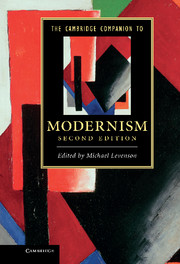Book contents
- Frontmatter
- Introduction
- 1 The metaphysics of Modernism
- 2 The cultural economy of Modernism
- 3 The Modernist novel
- 4 Modern poetry
- 5 Modernism in drama
- 6 Modernism and the politics of culture
- 7 Modernism and religion
- 8 Modernism and mass culture
- 9 Modernism and gender
- 10 Musical motives in Modernism
- 11 Modernism and the visual arts
- 12 Modernism and film
- 13 Modernism and colonialism
- Further reading
- Index
3 - The Modernist novel
Published online by Cambridge University Press: 28 September 2011
- Frontmatter
- Introduction
- 1 The metaphysics of Modernism
- 2 The cultural economy of Modernism
- 3 The Modernist novel
- 4 Modern poetry
- 5 Modernism in drama
- 6 Modernism and the politics of culture
- 7 Modernism and religion
- 8 Modernism and mass culture
- 9 Modernism and gender
- 10 Musical motives in Modernism
- 11 Modernism and the visual arts
- 12 Modernism and film
- 13 Modernism and colonialism
- Further reading
- Index
Summary
To write about the Modernist novel, as opposed to the Victorian novel, say, or the Edwardian novel, is to write not only about the possibilities of the genre, but about its perceived impossibility. The possibilities were evident enough. From about 1890 to about 1930, the novel was as popular as it had been during the Victorian period, and newly diverse. According to Henry James, in 1899, it was a universally valid form, "the book par excellence"; according to Ford Madox Ford, in 1930, it was indispensable, "the only source to which you can turn to ascertain how your fellows spend their entire lives." And yet there was also a feeling, more prevalent among writers than among critics, that the novel as traditionally conceived was no longer up to the job: that its imaginary worlds did not, in fact, correspond to the way one's fellows spent their entire lives. The feeling was most fully and influentially articulated by T. S. Eliot, when he argued, in "Ulysses, Order and Myth" (1923), that the novel had effectively "ended" with Flaubert and James: that the very formlessness which had once made it the adequate "expression" of a previous age, an age not yet formless enough to require "something stricter," now prevented it from expressing a modernity characterized above all by the loss of form.
- Type
- Chapter
- Information
- The Cambridge Companion to Modernism , pp. 69 - 98Publisher: Cambridge University PressPrint publication year: 2011
- 1
- Cited by



